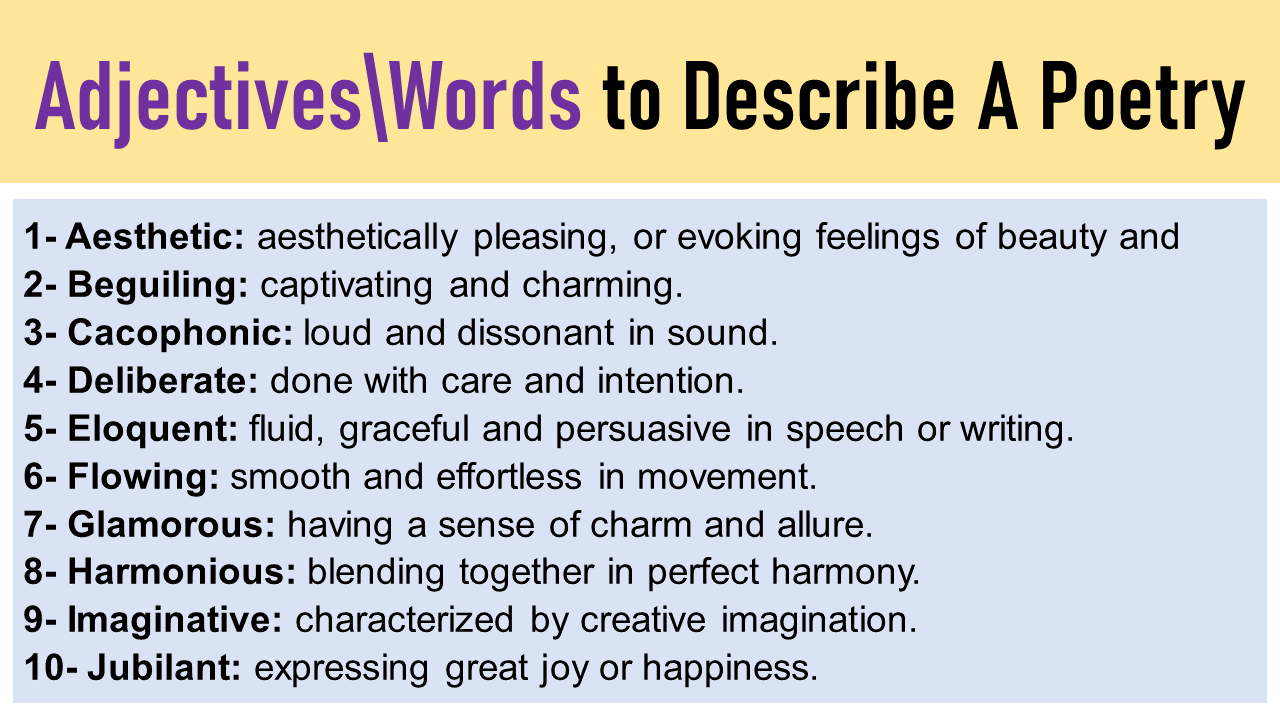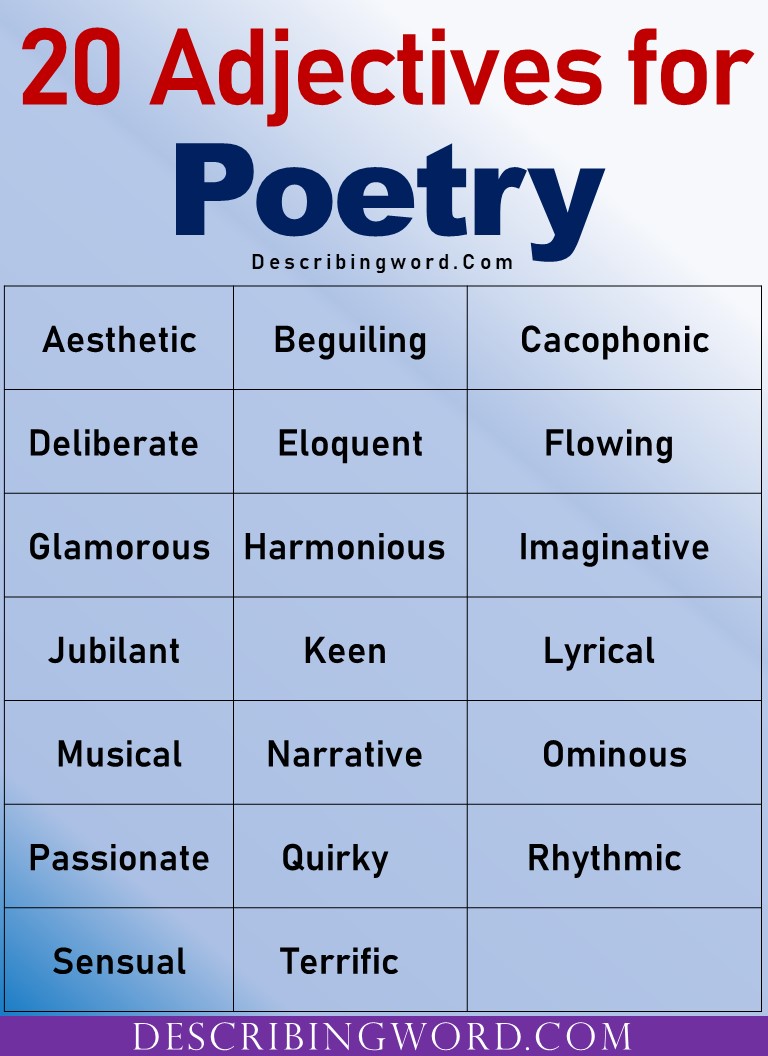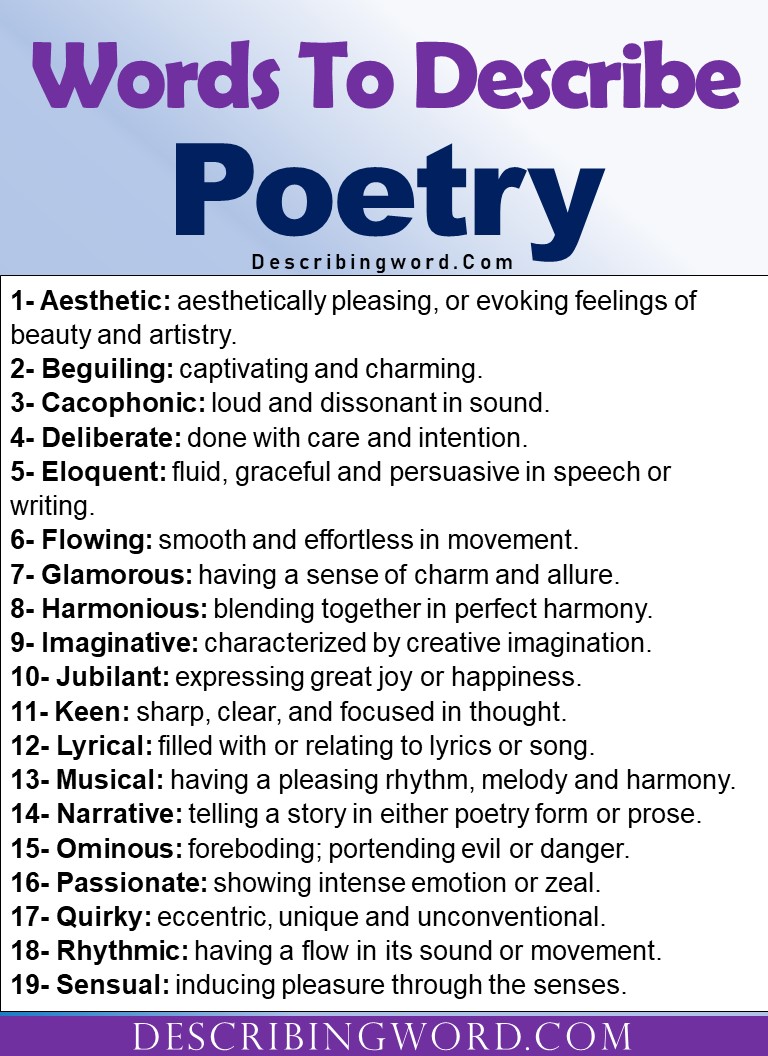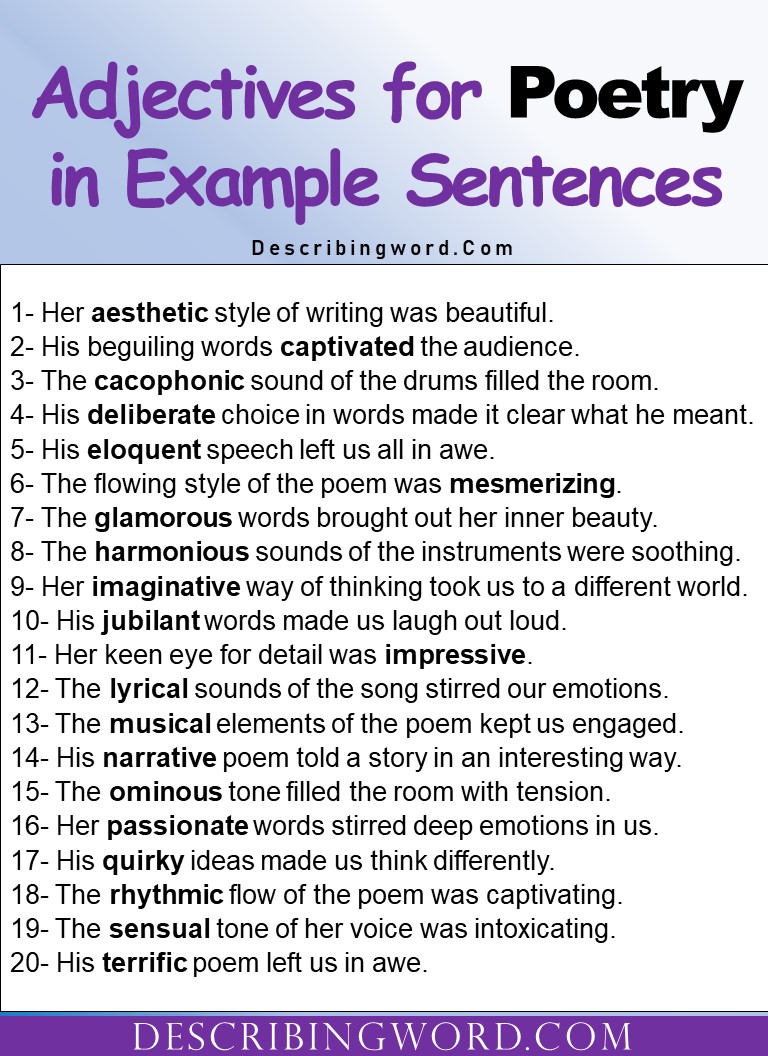Poetry often uses words that evoke emotion, allowing readers to feel a deep connection with the material. Adjectives can be used in poetry to help create and maintain this powerful emotional connection between the reader and the poem. Whether you are writing a poem or simply reading one, knowing the right adjectives can add depth and meaning to your work.
When looking for adjectives to use in poetry, consider words that add detail, express emotion, or capture a sense of the speaker’s experience. For example, if you are writing about love then try using descriptive words like passionate or tender instead of just saying “love.”
Additionally, think about what unique language will allow readers to best connect with your message. Powerful adjectives such as sorrowful or ecstatic can create vivid images in readers’ minds that bring your poem to life.
98 Adjectives for Poetry
- Luminous
- Ethereal
- Melancholic
- Serene
- Vivid
- Bleak
- Resplendent
- Tranquil
- Somber
- Radiant
- Ephemeral
- Tumultuous
- Celestial
- Verdant
- Forlorn
- Glimmering
- Mysterious
- Crimson
- Wistful
- Pristine
- Turbulent
- Iridescent
- Obscure
- Sweltering
- Frigid
- Majestic
- Sullen
- Elusive
- Vibrant
- Melodic
- Opaque
- Whispering
- Barren
- Harrowing
- Enigmatic
- Pensive
- Decadent
- Azure
- Wind-swept
- Smoldering
- Parched
- Sublime
- Sinister
- Untamed
- Nocturnal
- Searing
- Haunting
- Rugged
- Lush
- Stark
- Fragile
- Ablaze
- Muted
- Opulent
- Arid
- Intertwined
- Icy
- Sultry
- Glistening
- Forsaken
- Thunderous
- Shimmering
- Desolate
- Flourishing
- Spectral
- Unyielding
- Wispy
- Dappled
- Gloomy
- Scorching
- Twilight
- Cascading
- Beckoning
- Misty
- Timeless
- Billowing
- Fleeting
- Crisp
- Boundless
- Scattered
- Gritty
- Shrouded
- Golden
- Hushed
- Veiled
- Glacial
- Burnished
- Soothing
- Dreadful
- Chilling
- Reflective
- Evanescent
- Luminescent
- Weathered
- Serpentine
- Stifling
- Enveloping
- Roaring
Words to Describe Poetry (Meaning and Example Sentence)
- Aesthetic: aesthetically pleasing, or evoking feelings of beauty and artistry.
Her aesthetic style of writing was beautiful.
- Beguiling: captivating and charming.
His beguiling words captivated the audience.
- Cacophonic: loud and dissonant in sound.
The cacophonic sound of the drums filled the room.
- Deliberate: done with care and intention.
His deliberate choice of words made it clear what he meant.
- Eloquent: fluid, graceful, and persuasive in speech or writing.
His eloquent speech left us all in awe.
- Flowing: smooth and effortless in movement.
The flowing style of the poem was mesmerizing.
- Glamorous: having a sense of charm and allure.
The glamorous words brought out her inner beauty.
- Harmonious: blending together in perfect harmony.
The harmonious sounds of the instruments were soothing.
- Imaginative: characterized by creative imagination.
Her imaginative way of thinking took us to a different world.
- Jubilant: expressing great joy or happiness.
His jubilant words made us laugh out loud.
- Keen: sharp, clear, and focused in thought.
Her keen eye for detail was impressive.
- Lyrical: filled with or relating to lyrics or song.
The lyrical sounds of the song stirred our emotions.
- Musical: having a pleasing rhythm, melody, and harmony.
The musical elements of the poem kept us engaged.
- Narrative: telling a story in either poetry form or prose.
His narrative poem told a story in an interesting way.
- Ominous: foreboding; portending evil or danger.
The ominous tone filled the room with tension.
- Passionate: showing intense emotion or zeal.
Her passionate words stirred deep emotions in us.
- Quirky: eccentric, unique, and unconventional.
His quirky ideas made us think differently.
- Rhythmic: having a flow in its sound or movement.
The rhythmic flow of the poem was captivating.
- Sensual: inducing pleasure through the senses.
The sensual tone of her voice was intoxicating.
- Terrific: causing feelings of awe, admiration, and wonder.
His terrific poem left us in awe.
Positive Poetry Adjectives
- Beautiful – aesthetically pleasing
- Example: Her poetry is beautifully expressive.
- Powerful – having a great impact or influence
- Example: His words are powerful and moving.
- Emotional – expressing deep feelings
- Example: The poem was deeply emotional and stirring.
- Creative – showing imagination and originality
- Example: She crafts her poetry with creative flair.
- Smooth – flowing easily, seamless
- Example: His rhymes are smooth and well-constructed.
- Uplifting – inspiring happiness or hope
- Example: Her verses are uplifting and full of life.
- Thoughtful – showing careful consideration or attention
- Example: His poetry is thoughtful and introspective.
- Heartfelt – sincere, deeply felt
- Example: Her words are heartfelt and genuine.
- Expressive – effectively conveying thought or feeling
- Example: His expressive poetry touches many hearts.
- Engaging – capturing interest or attention
- Example: The poem was engaging from start to finish.
Negative Poetry Adjectives
- Confusing – difficult to understand
- Example: The poem’s structure is confusing and unclear.
- Dull – lacking interest or excitement
- Example: Her poetry can sometimes be dull and monotonous.
- Simple – lacking depth or complexity
- Example: His verses are too simple and shallow.
- Predictable – easy to foresee or anticipate
- Example: The ending of the poem was predictable.
- Overdone – done to excess; too much
- Example: The thematic repetition in her poetry is overdone.
- Monotonous – tediously uniform or lacking in variety
- Example: His rhyme scheme is monotonous and tiresome.
- Boring – not interesting; tedious
- Example: The long poem was ultimately boring.
- Uninspired – not creatively exciting
- Example: The verses felt uninspired and flat.
- Vague – not clearly expressed
- Example: His metaphors are too vague to be understood.
- Forced – artificially made, not natural or spontaneous
- Example: The emotion in the poem felt forced and unnatural.

Related Posts:
Positive Words to Describe A Beautiful Woman




